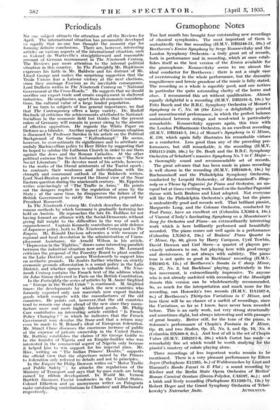Periodicals No one subj ect attracts the attention of all the
Reviews for April. The International situation- has presumably developed rapidly that no one has thought the moment ripe for forming definite conclusions. There are,' however, interesting articles on various aspects of the internationalsituation, such as Colonel de Watteville's- Straightforward and reasonable account of German rearmament m The Nineteenth Century. The Reviews pay more attention to the .internal political situation in this country. In The FortnightlyMr. Hopkinson expresses his faith • in . Mr. Baldwin- and his distrust --Of Mr. Lloyd George and makes the surprising suggestion that the Trade Unions fear a Labour victory. at the next elections, since they envisage Fascism as- its inevitable consequence. Lord Dufferin writes in The Nineteenth Century on "National Government at the Cross-Roads."- He suggests that We should sacrifice our export trade and create employment in sheltered industries. He emphasizes, apart from all economic consider:a- tions, the cultural value of a large landed population. . . If we turn to subjects of less general importance, we find that The Contemporary offers a large variety. Dr. Rudolf Breitselleid criticizes the achievements attributed to National- Socialism- in the economic field but -thinks ant the present ruler's of Germany will remain in power Owing -to the absence - of effective opposition. He regards' the White Paper on Defence as a blunder. Another aspect of the German situation is discussed by Professor Sarolei in his article on the Political Background of the German " Kulturkampf." He seems, however, to over-estimate its significance and to attribute an unduly Machiavellian policy to Herr Hitler by suggesting that he hoped to subdue the Lutheran Church in order to use them against the Jews and the Roman Catholics. At the other political extreme the Soviet Ambassador writes on " The New Soviet Literature." He devotes most of his article, however, to the works of the liberal aristocrats of the Tsarist epoch; he contrasts their weakness - and individualism with the strength and communal outlook of the Bolshevik writers. Lord Noel-Buxton puts forward the liberal view of the Near Eastern question during the nineteenth century. Mr. Eppstein writes convincingly of .."The'_ Traffic in . Arms." He points out the dangers implicit in the regulation of arms by the State; at the same time, he disapproves the failure of the British Government to ratify the Convention proposed by President Roosevelt. • In The Nineteenth Century Mr. Crotch describes the subter- ranean methods by which Germany is gradually fastening her hold on Austria. He reproaches the late Dr. Dollfuss for not having formed an alliance with the Social-Democrats without giving full weight to the difficulties in the way of such a rapprochement. Captain Kennedy contributes an able defence of Japanese policy, both to The Nineteenth Century and to The Empire. Mr. Ronald Davison advocates a wide measure of regional and local devolution in the administration of Unem- ployment Assistance. Sir Arnold Wilson in his article, Depression in the 'Eighties," draws some interesting parallels between the industrial situation now and then. Mr. Lennard criticizes the proposal of the Forestry Board to plant conifers in the Lake District, and quotes Wordsworth to support him on aesthetic grounds. He doubts further whether on strictly economic grounds afforestation is a sound policy in the Lake District, and whether spruce is valuable timber. The Nine- teenth Century contains the French text of the address which Sir John Simon delivered in Paris on the British Constitution. In the Fortnightly the series of articles by M. Andre Siegfried on " Europe in the World Criss " is continued. M. Siegfried traces the developments by which the new countries who formerly exported only raw materials now export finished goods which compete with the manufactures of the old countries. He points out, however, that the old countries tend to remain one stage ahead of the new since they manu- facture more and more highly finished goods. Mr. Philip. Carr contributes an interesting article entitled " Is French Policy Changing ? " in which he indicates that the French Government may devalue the franc and that a return may even be made to M. Briand's ideal of European federation. Mr. Stuart Chase discusses the enormous increase of public at the expense of private ownership in the United States. Mr. Rattnly establishes the claims of Sir George Goldie to be the founder of Nigeria and an- Empire-builder who was interested in the commercial aspect of Nigeria only because it helped him to win support for his imperial aims. Mr. Rice, writing. on ". The Indian Princes' Doubts," supports the official view that the objections raised by the Princes to federation only referred to details and not to principles. In the Empire Sir Philip Da*rson, writes mi..'" Motor Traffic and Public -Safety " ; he attacks the regulations of the Ministry of Transport and says that by-pass roads are being ruined by ribbon development. In , World Mr. Vernon Bartlett discusses, Fascist tendencies in. the, United States. Colonel Etherton and an anonymous writer on Patagonia make outstanding contributions to Chamber's' and Black-wood's respectively. , ,










































 Previous page
Previous page